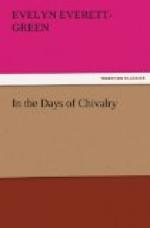“Joan,” he said, in low, firm tones that shook a little with the intensity of his earnestness, “when I saw thee first, and knew thee for a very queen amongst women, my boyish love and homage was given all to thee. I dreamed of going forth to win glory and renown, that I might come and lay my laurels at thy feet, and win one sweet answering smile, one kindly word of praise from thee. Yet here am I, almost at man’s estate, and I have yet no laurels to bring to thee. I have but one thing to offer — the deep true love of a heart that beats alone for thee. Joan, I am no knightly suitor, I have neither gold nor lands — though one day it may be I may have both, and thy father would doubtless drive me forth from his doors did I present myself to him as a suitor for this fair hand. But, Joan, I love thee — I would lay down my life to serve thee — and I know that thou mayest one day be in peril from him who is also mine own bitter foe. Wilt thou then give me the right to fight for thee, to hold this hand before all the world and do battle for its owner, as only he may hope to do who holds it, as I do this moment, by that owner’s free will? Give me but leave to call it mine, and I will dare all and do all to win it. Sweet Mistress Joan, my words are few and poor; but could my heart speak for me, it would plead eloquent music. Thou art the sun and star of my life. Tell me, may I hope some day to win thy love?”
Joan had readily surrendered her hand to his clasp, and doubtless this had encouraged Raymond to proceed in his tale of love.
He certainly had not intended thus to commit himself, poor and unknown and portionless as he was, with everything still to win; but a power stronger than he could resist drew him on from word to word and phrase to phrase, and a lovely colour mantled in Joan’s cheek as he proceeded, till at last she put forth her other hand and laid it in his, saying:
“Raymond, I love thee now. My heart is thine and thine alone. Go forth, if thou wilt, and win honour and renown — but thou wilt never win a higher honour and glory than I have seen thee winning day by day and hour by hour here in this very house — and come back when and as thou wilt. Thou wilt find me waiting for thee —ever ready, ever the same. I am thine for life or death. When thou callest me I will come.”
It was a bold pledge for a maiden to give in those days of harsh parental rule; yet Joan gave it without shrinking or fear. That this informal betrothal might be long before it could hope to be consummated, both the lovers well knew; that there might be many dangers lying before them, they did not attempt to deny. It was no light matter to have thus plighted their troth, when Raymond was still poor and nameless, and Joan, in her father’s estimation, plighted to the Sanghurst. But both possessed brave and resolute spirits, that did not shrink or falter; and joyfully happy in the security of their great love, they could afford for a time to forget the world.




